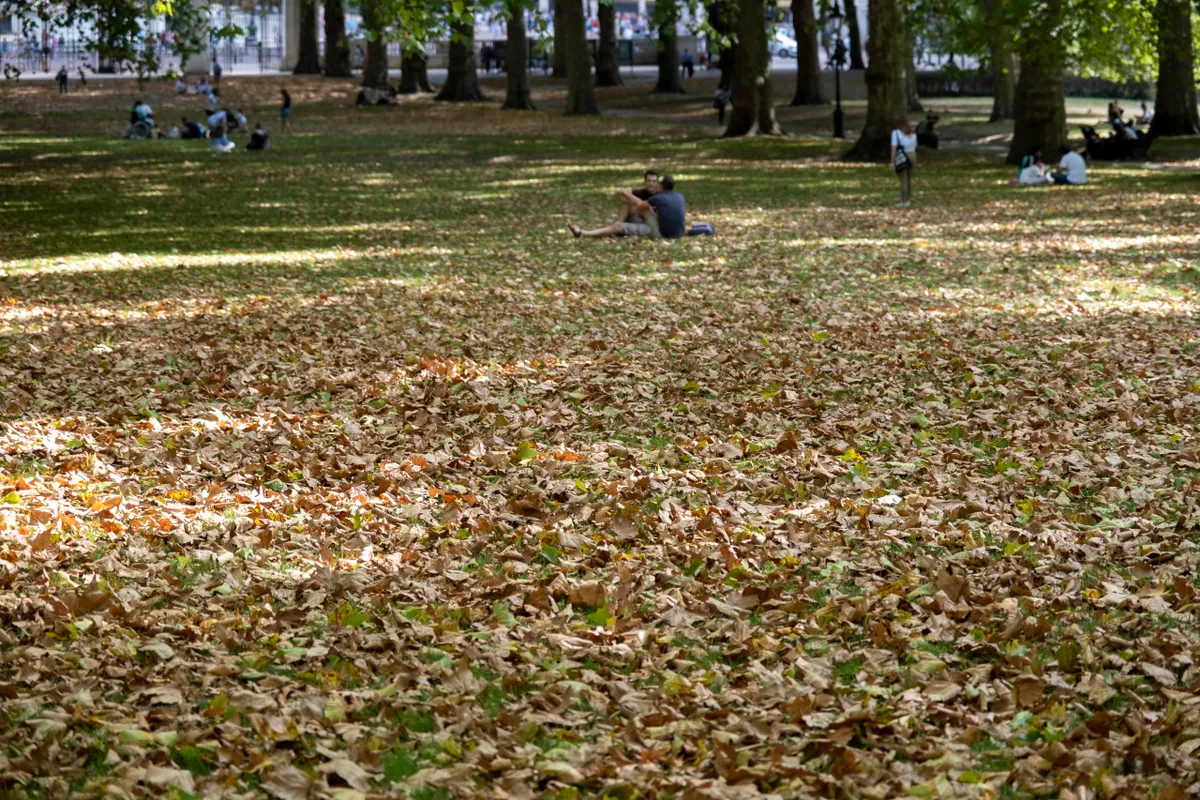A thick carpet of leaves crunches satisfyingly underfoot, but there is a problem. As I write this, it is still high summer. By the time you read this, I wonder what autumn will look like?
Autumn leaf senescence is a tree’s answer to the transition to winter. The process begins with recovering precious resources from each leaf (think leafy green chlorophyll being withdrawn, leaving behind the yellows and reds of autumn). The action then moves to the base of the leaf stem, or petiole, where the cell walls break down, weakening the leaf’s lifeline to the tree it has served so well. Eventually, of course, the dried and shrivelled leaf is shed.
A tree shedding its leaves in high summer is an emergency.
If trees expect anything, then this is what they expect. A nice, normal, controlled response to shortening daylight hours – an environmental cue that has proved stable and dependable through evolutionary time. A tree shedding its leaves in high summer, on the other hand, is an emergency.
As Britain waved goodbye to the summer of 2022, the season went down in history for record-breaking heatwaves and drought right across the northern hemisphere. Well-reported was August’s ‘false autumn’; a mass leaf-drop brought on by what is thought to be the worst drought in Europe for over 500 years.

Leaves are perfectly poised to capture maximum energy arriving from the sun but in a drought they become a liability. The first coping mechanism is to shut down operations by closing microscopic gateways, called stomata, that normally allow the exchange of gases for photosynthesis. Stomata also help drive another vital process called transpiration, which draws water up from the root system to the leaves. Closing the stomata is a desperate attempt to save water. If the heat is still on, the last line of defence is to ditch the leaves altogether with the promise of living to see another spring. But the story doesn’t end there.
A hidden toll may come into play in the early autumn and will carry through to next spring. Trees use this year’s energy to lay down next spring’s leaves and flowers. With the growing season cut short for some, will these trees be able lay down the buds for the next year?
How are young trees expected to establish when the odds are stacked against them?
Trees aren’t completely naive – different species have varying degrees of drought tolerance and adaptations. While beech and birch trees are more susceptible, oaks are more drought tolerant, thanks to better water-saving features, including a thicker cuticle, a multi-layered epidermis and fewer stomata.
A recent study has found that Arabidopsis thaliana (the lab rat of the plant kingdom) produces its own ‘aspirin’ in the form of salicylic acid to protect against the harmful effects of prolonged heat exposure. Some hope that by understanding the mechanism and genomic sequence of this plant, researchers can develop more drought-resistant trees and crops that bud set and bud burst at the right time of year. This could be a tough nut to crack, however.
Perhaps a more important learning from this year’s drought-stressed trees is that younger trees tend to be more vulnerable to drought and heat extremes than mature individuals. It raises the question about high-carbon-emitting industries that claim to offset business-as-usual practices with grand tree-planting pledges. How are young trees expected to establish when the odds are stacked against them? In this case, growing up in a world where industries continue to pump greenhouse gases into the atmosphere?
For my part, I’m becoming a hard woman to please. After witnessing this year’s ‘false autumn’, it’s going to take a lot more than just sheer numbers of trees plopped in the ground, complete with plastic-guard, to impress me. Yes, you can plant a tree, but will it survive and thrive?
Main image: Early fallen leaves of trees under stress of heat and lack of rain in Green Park on 24th August 2022 in London. © Mike Kemp/In Pictures via Getty Images
